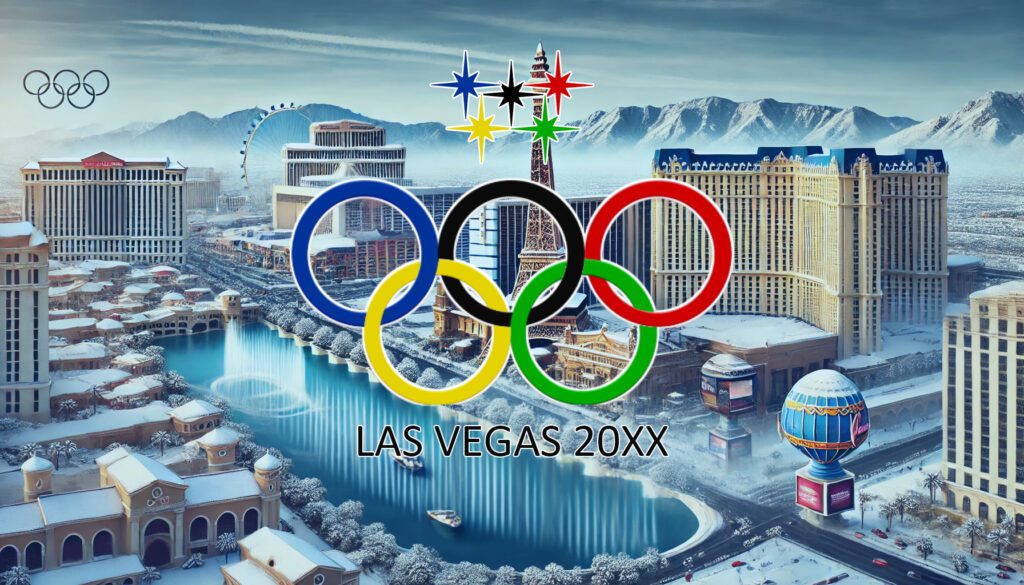The Olympics are approaching (Summer Olympics not Winter Olympics), Go Team USA! With the Olympics on my mind and Las Vegas also usually on mind, I put the thoughts together and did the research. Las Vegas is renowned for many things but when it comes to hosting the Winter Olympics, it’s not the first city that comes to mind. However, a closer look at the city’s infrastructure reveals that Las Vegas is almost—but not quite—ready for such a monumental event. Here’s an exploration of the city’s capabilities and where it falls short.

T-Mobile Arena: A World-Class Venue for Ice Hockey
The T-Mobile Arena stands out as a premier venue in Las Vegas, boasting a seating capacity of 17,500 for hockey games. Home to the NHL’s Vegas Golden Knights, the arena has hosted numerous high-profile events, including the Stanley Cup Finals. Its world-class facilities, including 50 luxury suites and advanced locker rooms, make it an ideal location for Olympic ice hockey events. The arena’s versatility is further demonstrated by its ability to host various sports and entertainment events, from UFC fights to major concerts.
Las Vegas Ice Center and City National Arena: Training and Smaller Competitions
The Las Vegas Ice Center features two NHL-sized ice rinks, providing ample space for figure skating and hockey. While the center is well-suited for training and smaller competitions, it lacks the seating capacity and grandeur required for Olympic-level events. Similarly, the City National Arena, which serves as the practice facility for the Golden Knights, offers two NHL-sized rinks and modern amenities but does not have the infrastructure to host large crowds. Although, if one rink is disassembled at each location, this would allow room for seating… just an idea.
Mt. Charleston and Lee Canyon: Natural Beauty with Limitations
For outdoor winter sports, Mt. Charleston and Lee Canyon offer natural slopes for skiing and snowboarding. Lee Canyon features various slopes and a terrain park, making it a popular local destination. According to historical snowfall data, Lee Canyon averages about 101 inches of snow per year, with some years experiencing substantial snowfall (OnTheSnow). While this is promising, the area’s infrastructure and vertical drop still fall short compared to major winter sports destinations like those in the Rockies or the Alps.
Climate and Geographical Challenges
One of the biggest hurdles for Las Vegas in hosting the Winter Olympics is its desert climate. While the city excels in creating artificial environments, the natural winter conditions required for events like alpine skiing, biathlon, and cross-country skiing are not naturally present. Significant investment in infrastructure, such as artificial snowmaking and enhanced transportation to remote locations, would be necessary to make these events feasible.
Potential for Indoor Events
Las Vegas could realistically host several indoor Winter Olympic events, leveraging its existing venues. The T-Mobile Arena could handle ice hockey and figure skating, while the Las Vegas Ice Center and City National Arena could be used for training and smaller competitions. However, transforming the city into a full-fledged Winter Olympics host would require addressing the substantial gaps in outdoor sports infrastructure.
The Verdict: Close, But Not Quite
In summary, while Las Vegas boasts impressive facilities like the T-Mobile Arena and has local venues for training and smaller ice sports events, it faces significant challenges with outdoor winter sports. The climate and geographical limitations would require extensive investment and planning to overcome. Thus, while Las Vegas is almost good for the Winter Olympics, it isn’t quite there yet. The city’s existing infrastructure provides a strong foundation, but achieving full readiness for the Winter Olympics would require substantial development and innovation.









